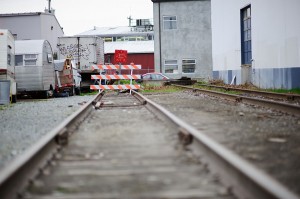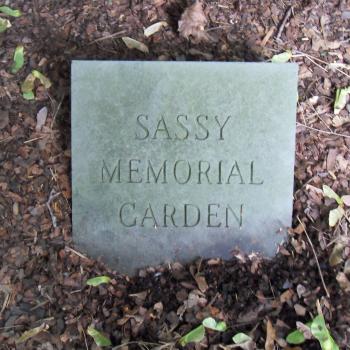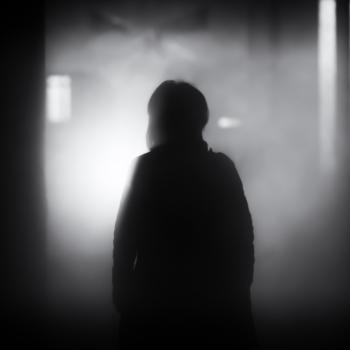 Outside our trailer park, a set of railroad tracks ran from east to west, dividing us from the police station that sat half a mile down the road. When you drove over the tracks, and felt the car pull itself over the split asphalt, it seemed like you were being locked in or released, depending on which way you were driving.
Outside our trailer park, a set of railroad tracks ran from east to west, dividing us from the police station that sat half a mile down the road. When you drove over the tracks, and felt the car pull itself over the split asphalt, it seemed like you were being locked in or released, depending on which way you were driving.
I used to walk along the tracks at dusk, singing and talking to myself, the fields stretching westward behind me as the sun sank behind the Walgreens. I practiced lines for my high school plays; I imagined what it would be like to walk with whichever boy at school I liked at the time. I tried to keep myself occupied as long as I could, tried to fill my mind with anything besides the dull dread that I knew would be waiting for me once I got back home.
What is poignant about this scene is that it is one of the few memories I have where the sensory detail is so vivid—I have bits of images, movements, but it is hard to place whole memories. I know that so much of what happened has been buried deep within me, and when something surfaces, I have to try to catch as much as I can.
What I remember, mostly, is walking: walking to the curb to meet the police officer before my mother’s boyfriend knew I had called; walking my mother to her bed with her lips against my ear, drunk and sorry and heaving sobs so big that I almost lost my grip on her shoulder. Walking in the fiery shafts of light that cut across the tracks, my voice carrying over the cornfields: But it wouldn’t be make believe / if you believed in me.
Memory is, to me, one of the heaviest burdens you carry when you come from a family like mine. Even the good memories are burdens; they always cast a wistful shadow, make you think about what things could have been like, what things might have been.
And what I’ve heard from others, those who come from families like mine, and those who don’t, is that a sure way to release the burden of these memories, is to forgive.
I know that to not forgive is not an option; I am a Christian, and forgiveness is the central tenant, the lynchpin, the way through the eye of the needle.
But there is something in the idea of forgiveness that, at this point in my life, makes me nauseous.
It isn’t that I don’t want to forgive my parents for the things that have happened. I’ve told them that I forgive them, many times over, but the memories remain. Truth be told, the same things keep on happening. New memories emerge. And as I make my way through marriage and parenthood, I find myself locked in a perpetual mode of defense, my gut and throat tightening whenever the topic comes up.
I suppose it’s the finality of it—if I say that I forgive, there are no more grounds for me to be suspicious or wary of the loved ones who have hurt me so deeply. It’s done, over, the past belonging to the past, and the future a blank slate that I somehow owe to the ones that hurt my siblings and me so deeply. “How wonderful it must be,” I’ve heard, “to forgive and leave all that behind you.”
But when the ones I’m supposed to forgive continue to present real and present danger to me and my loved ones—when my mother’s insistence on another visit to our home leaves me breathless and weeping in our armchair—it doesn’t seem right.
And neither does the view of forgiveness as a way to free myself from these memories. “Do it for you,” I’ve also heard, and while I get that letting my mother and father off the hook could create some distance, it also seems to fall short of the ones forgiveness is intended for, both victim and perpetrator.
In Patty Griffin’s song “Forgiveness,” there is a line that catches my throat each time I hear it: We are calling for help tonight / on a thin phone line.
That’s what my whole childhood felt like: a call for help, a repeated dialing of the phone, the police leaving and my mother’s boyfriend staying, my mother walking out the door to get to the bar at its opening, her figure diminishing as I watched from the door. I walked the line of railroad ties and hoped that something would open up to us, let us out, set us free from the terror and ache we knew.
What it comes down to, I think, is that forgiveness is neither altar call nor personal mantra, but a reality to be lived into, something that calls out to us from the edges of what we know and feel and believe. It is the desire and the move to love, and what I know is this: that I love my family fiercely and deeply. There is nothing I want more than the ease other families share, the comfort of trust and the freedom of letting go.
But there is a great gap fixed between that desire and the present reality, the ongoing difficulties that my family presents, the continual unfolding of memories, my parents’ inability to seek forgiveness themselves, their limitations and their own fixations on what was robbed from them too large to shake off.
How will the gap be bridged? I have no idea. I spent my twenties mourning the childhood I had and looking for ways to make my life new. And as my life has turned, the cycle of mourning continues: my siblings’ own memories, splintered as mine, piece themselves together, and we are left sobbing and shaking and unable to sleep at night.
And in the sleeplessness, I nurse my son. He eats and returns to sleep, his body a sturdy weight against my shoulder, a buoy, a promise, the morning light rising in the window, the Wyoming sky stretching over us, wide and open.
Allison Backous Troy teaches at Kuyper College in Grand Rapids, Michigan, and is the creative writing editor for The Other Journal. She graduated from the Seattle Pacific University’s Master of Fine Arts in Creative Writing program in 2009.
This is Allison Backous Troy’s last regular post for “Good Letters.” We thank her for her beautiful writing and wish her well.











